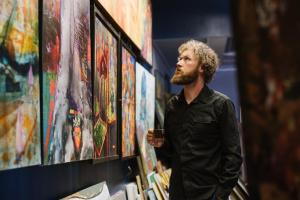Unlocking the World of Art Collecting: A Beginner's Guide
Want to be a great art collector? This article will teach the basics and how to get better at the craft.
The art of art, the glory of expression and the sunshine of the light of letters, is simplicity.”
NEW YORK, NEW YORK, U.S.A, June 9, 2023/EINPresswire.com/ -- Drawn to the mesmerizing strokes of a painting or the intricate details of a sculpture and always wondered what it takes to become an art collector? Or what it takes to embark on an exciting journey of discovering new artists and appreciating the beauty of art but don't know how? Then, this article is a must read, especially for first-time art collector or simply someone who wants to learn more about the art world. This guide explores essential tips that can help anyone get started on their art collecting adventure with confidence.— Walt Whitman
Let's get into it.
-Research: One of the first and most crucial steps in becoming an art collector is to conduct careful research. "Take the time to explore the artists, art movements, and trends that capture your interest." A first-time art collector can start by learning more about the artists whose work resonates with them. Discover the artist's story, artistic styles, and their contributions to the larger context of art history. By understanding the background and context of an artist's work and gaining a deeper understanding of the art world, a newbie art collector can make more informed decisions about what to buy and how much to pay for each piece.
-Find your taste: "Art is subjective, and as a collector, it's important to know what art style or preferences tickle your fantasy the most." Is it paintings, sculptures, prints, or photographs? Or maybe abstract or realistic art styles? Any art collector must first understand their art taste as it will guide them into building a collection that truly reflects their unique aesthetic. Regardless of the cost, every art piece and collection should always please the owner.
-Learn the different types of art: Art comes in many forms, each with its unique characteristics and value. a new art collector must familiarize themselves with the different types of art, such as painting, sculpture, printmaking, and photography. This will help them appreciate each art type and make informed decisions when collecting.
-Budget: Before anyone starts collecting art, they should look at their current financial situation. "You must answer the question: how much money can I comfortably spend on buying art pieces?"
Once this has been done, a budget should be set for art collecting. This will help them stay on track and not spend too much.
-Explore Art Fairs: Art fairs can be a great way to kickstart an art collection. Art fairs offer a wide variety of artworks by different artists, galleries, and price points, making it easy for any art collector to find pieces that align with their taste and budget. Attending art fairs also provides an opportunity to meet artists and build valuable connections.
"Investing in quality art can lead to appreciation over time and potentially provide more value when sold." - Avi-Meir Zaslavsky.
-Start Small and Be Patient: Building an art collection takes time, so it's essential to be patient and start small. Begin with affordable artworks such as prints, drawings, or smaller paintings to build a collection without breaking the bank. "Take time to find pieces that resonate with you and you truly love."
"As an art collector, it's important to know your taste and preferences to create a collection that reflects your unique aesthetic." - Avi-Meir Zaslavsky
-Get an expert: Another valuable tip for first-time art collectors is to seek the guidance of an art expert. Hiring an art consultant or advisor can be a wise investment, as they can provide valuable insights and expertise in navigating the art world. "You don't want to spend money on art that is fake or does not align with your taste and budget." Get an art expert to help negotiate prices and ensure the authenticity of the pieces bought. Their knowledge and experience can be invaluable in building a collection that you love and that has potential value in the long run.
-Invest in quality art: When building an art collection, it's also essential to focus on quality rather than quantity. Quality art is often created by established artists who have a proven track record of producing work that is well-regarded by critics and collectors. "Also, quality rather than quantity art appreciates over time and can give you more money whenever you decide to sell it in the future." So, while it can be tempting to acquire multiple pieces at once, it's important to carefully consider the quality and value of each artwork.
-Maintenance of art pieces: Proper maintenance of an art collection is crucial to ensure that the pieces remain in good condition for generations to come. Knowing the materials used to create the pieces and how to properly store them can be helpful in properly maintaining them. Seeking professional advice on how to care for a collection can help protect them and ensure their aesthetic value is enjoyed and appreciated for years to come.
"Art collecting is a journey of exploration and discovery that requires careful research and patience." - Avi-Meir Zaslavsky
In conclusion, art collecting can be a fulfilling and exciting hobby for first-time collectors. Just remember to follow the guidelines above to have a wonderful experience.
Happy collecting.
Avi-Meir Zaslavsky
999Art
amz@999global.com

